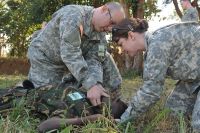LILONGWE, Malawi, May 11, 2011 — A U.S. and Malawi Defense Force humanitarian medical exercise being conducted here is enhancing the partners’ medical capabilities and their ability to work together in response to a future crisis or emergency response, the commander of the National Guard element providing command and control for the operation reported.
The exercise, MEDREACH 11, kicked off May 3 and continues through May 16. It brings together about 100 U.S. and 300 Malawi troops. The exercise includes classroom instruction, field training, and civic assistance activities, to include medical and dental outreach programs in specific areas of Lilongwe.
Malawi is a landlocked country located in southeast Africa. Lilongwe is the capital city.
The goal of the exercise is for the two militaries to learn from each other as they forge close partnerships that benefit both nations, as well as the broader region, explained Army Brig. Gen. Robert Pratt, commander of the Illinois National Guard’s 404th Maneuver Enhancement Brigade.
“This is a great operation for us,” Pratt said. “We are learning from each other, and we are both stronger because of that.” The impact of MEDREACH 11 goes beyond patients treated and friendships formed, said Navy Cmdr. Jonathan Adams, exercise planner for U.S. Africa Command. The exercise, he said, is part of Africom’s engagement in Africa that’s aimed at strengthening partnerships and partner capacity.
The ultimate goal, Adams explained, is to help African nations better support the African Union’s Regional Standby Force concept so they can respond together in times of crises — providing humanitarian assistance and disaster response, deploying peacekeeping forces or responding to a regional threat. “One of the far-reaching goals of Africom, in general, is to aid the Africans in dealing with African challenges,” Adams said.
The best way to accomplish that, he said, is through a robust exercise program built on strong military-to-military relationships. MEDREACH 11, led by U.S. Army Africa, is among 16 Africom exercises conducted this fiscal year alone. Many, like MEDREACH, he said, have a medical focus.
The U.S. military has a long history of medical engagement in Africa, Adams explained. For nearly a decade, he said, U.S. European Command conducted medical exercises in Africa, deploying teams of doctors, dentists and support personnel to provide joint-combined medical training and humanitarian assistance. The standup of Africom has changed the focus of the exercise program, Adams said, noting the goal now is to strengthen relationships already formed while helping host nations’ militaries build professionalism and capability.
Adams said medical clinics and civic-action programs remain key pieces of the exercise planning.
“But our major focus is on increasing the capabilities and our interoperability with the [African] medical forces that will be deployed for future operations,” he said. Africom is striving to promote more regional military cooperation, Adams said, so African nations are better prepared to respond together to a regional crisis. MEDREACH 11 is a bilateral exercise, he said, with observers from Mozambique, Botswana, Namibia and Lesotho expected to participate.
“Our future goal is to have it truly be a multilateral, cooperative exercise,” Adams said. “By proving our goodwill and showing the benefit of working with Africom, we hope to encourage more cooperation from the others at the same time.”
For example, he said, the Natural Fire exercise series in eastern Africa has brought together militaries from regional neighbors and the United States to focus on humanitarian and civic assistance, disaster relief and security.
“That involves many partners from the eastern African region, not just one,” Adams said. “And when we get that more truly established in other regions as well, that will be our big goal.”
Additional multilateral exercises are in the discussion or planning stages, he said. Such multilateral military-to-military engagement, he added, will posture African nations to better provide for their own security and crisis response.
The African Standby Force was stood up to be an international, continental African military force envisioned to deploy during times of crisis in Africa under the direction of the African Union. All five African regions — north, south, east, west and central — are in the process of establishing regional brigades to support the concept.
The success of this concept in supporting a secure, stable environment that prevents violent extremism from taking root affects far more than the African continent, Adams said. “A secure Africa improves security worldwide,” he said. “By improving regional stability, we help to build the militaries and the governments that can prevent these [terrorist] sanctuaries from being created, and in the bigger scheme, reduce the effectiveness of the enemies who would do harm to us from those bases of insecurity.”
Source:
U.S. Department of Defense
Office of the Assistant Secretary of Defense (Public Affairs)

 von
von 